Tolstoy and the Doukhobors
By Koozma J. Tarasoff. All
rights reserved.
Presented in the Section: "Lessons from Nonkilling Leadership Experiences" (pages 207-214),
Video of my presentation, minutes 24:45 to 40:50.
First Global Nonkilling Leadership Forum, Hawaii, November 1-4, 2007.
Proceedings — Affirmations — All Videos — 25 Testimonials from Readers — ‘Nonkilling’ Leaders Meet
Lesson 1: Learning,
inspiring,
cooperating and acting with conviction.Presented in the Section: "Lessons from Nonkilling Leadership Experiences" (pages 207-214),
Video of my presentation, minutes 24:45 to 40:50.
First Global Nonkilling Leadership Forum, Hawaii, November 1-4, 2007.
Proceedings — Affirmations — All Videos — 25 Testimonials from Readers — ‘Nonkilling’ Leaders Meet
Lesson 2: Exposing the truth about war and killing is a way to discover alternatives.
Lesson 3: The importance of values, education, and work for the health of humanity.
Lesson 4: Letters build networks and wisdom for cultivating world citizenship.
Lesson 5: The Law of Love is central to understanding the peaceful life.
Lesson 6: We can indeed introduce Tolstoy as a nonkilling literary leader.
In the evolution of ideas of getting rid of the institution of militarism and war — the creation of a society based on the new paradigm of love and nonkilling — the lessons of Tolstoy and the Doukhobors merit special attention.
My ancestors the Spirit Wrestlers or Doukhobors [may have] evolved centuries back stemming from the
As hardworking pioneers living in a communal setting, the Doukhobors first settled in the Crimean region of southern Russia in the 1700s. Later they were exiled to the Caucasus between the Caspian and Black Seas. In 1899 one-third or 7,500 were exiled to Canada where some 40,000 reside today. A similar number reside in scattered areas of Russia today. (See migration details at Doukhobor Historical Maps, by Jonathan Kalmakoff.)
The Doukhobors’ two acts of defiance against militarism in 1895 have been a profound inspiration for them up to the present time. First, on Easter of that year, the young soldier Matvey Lebedev and ten other Doukhobors threw down their guns while training in the Elizavetpol reserve battalion in the Caucasus region of southern Russia, stating that war and Christianity are incompatible. The result was that the dissidents were sent to a disciplinary battalion and exile along with 60 other Doukhobor young men in active service who followed their example (Tarasoff, 2002: 262-263).
Second, on midnight of June 28-29, 1895 (Old Style; new style is 11-12 July), 7000 Doukhobors in three districts of the Caucasus set ablaze piles of their rifles, pistols and swords (mostly government issues) in the first mass protest in history against war and militarism. The Tsarist government perceived this as treason and its response was swift with severe floggings, killings and exile.
This event that literally shook the world (Tarasoff, 2006: 244) attracted the attention of Lev N. Tolstoy, the most popular Russian writer and philosopher of the day. Doukhobors normally lived in peaceful communities. They worked hard, did not kill and were real Christians in action. Tolstoy saw his moral ideas implanted in the life of the Doukhobors.
More
- Chapter 1: DOUKHOBORS — an Overview. Excerpt from Spirit Wrestlers: Doukhobor Pioneers’ Strategies for Living (2002). Revised and updated.
- Tolstoy and
Doukhobors: A list of many online references.
Lesson 1: Learning, inspiring, cooperating and acting with conviction.
The Arms Burning event was unique. Geographically isolated, it was of a scale, visual impact and ideology that could not be ignored by the government, the church, the media, as well as the most prominent writer of the day Lev Tolstoy. The Doukhobors were prepared for persecutions and death, even though their leader Peter V. Verigin (who was in exile, was influenced by Tolstoy ideas and was in correspondence with him) hoped to receive support from Tolstoy (Sanborn, 1995).Lev Nicholaevich Tolstoy, his Son Sergei, his friends and the Quakers came together for this great cause of nonkilling and helped the Doukhobors from becoming extinct. Tolstoy penned an ‘Appeal for Help’, completed his book Resurrection and helped 7500 Russian dissidents (the most persecuted, about one-third of the whole) to immigrate to Western Canada in 1899.
As a Great Russian writer and philosopher Lev Tolstoy (1828-1910) was indeed a literary artist who was dedicated to nonviolence / nonkilling. His many writings reflected his philosophy. Gradually he evolved from a rich spoiled child to a moral figure, as shown in the evolution of his literary works. At the end of 1856, Tolstoy retired from five years of military service and soon made a six-month tour of Europe. While in Paris, he was so shocked by the guillotine execution of a prisoner that he later was stimulated to lobby for the end of capital punishment. His major epoch work War and Peace (1864-1869) showed the wider picture of war between Russia and Napoleon, and the absurdity of it all.
Lesson 2: Exposing the truth about war and killing is a way to discover alternatives.
Tolstoy was one of the first to seriously question the very nature of war, especially the act of killing. In his writings Prisoners of Caucasus and in War and Peace he looked at the psychological causes of war. Why war? What is it about? Why is it driven by some tyrannical power of the divine right of kings, the Gods, or the Empire? Why is it that states conscript men and resources to maintain power (Samson, 1987)?In answer, Tolstoy exposed the falsehood, hypocrisy and absurdity of war. Soldiers, he said, glory in the mystique of power to the point that they are persuaded to go against their conscience and moral upbringing of ‘Thou shalt not kill’. They believe in cannon-fodder because they have been hypnotized from childhood in school books, church services, sermons, speeches, books, newspapers, poems and monuments, writes Tolstoy (Tolstoy, 1893: 508).
Today we can truly say that war is a blight on our civilization and a slavery of our times. It reverberates through the centuries including the hope in recent times of the United Nations to get rid of the scourge of war. The military and their generals, together with the politicians who dictate that men must kill for the state as a patriotic duty as well as the religious leaders who support the cause are all part of the institutions that keep people in slavery. They perpetuate the act of state-sponsored murder and hinder the path towards a nonkilling society. The way to stop the wholesale slaughter of people, wrote Tolstoy, is to refuse supporting war as we have done with the trading of human slaves.
Lesson 3: The importance of values, education, and work for the health of humanity.
The search for truth and the meaning of life gave Lev Tolstoy width and depth in becoming a world literary figure as well as a moral leader. In his Socratic quest, he was not afraid to question personal behaviour and societal injustice.In Anna Karenina (1873-1876) he unveiled the Russian society with its aristocrats, peasants, the military and the church. Then in his book The Kingdom of God is Within You (1893) he laid down his philosophical/religious principles of life. The Kingdom of God which is within you can only be reached by effort, he said, through responsible action and through the search for truth.
Until 1861 the majority of the Russian people was serfs and had no rights. The rich aristocracy had the power and rights. Here Tolstoy reassessed his past, and at his Yasnaya Polyana home he started to understand the injustice of life of his own peasants. He saw the beauty of the common man and was the first to liberate them. Tolstoy opened a school for peasants on his family estate before helping to found 20 more schools in neighbouring villages. He believed in freedom of information and allowed his students to study whatever they desired. As editor of an educational journal, Tolstoy wrote that upper classes had as much to learn from peasants as peasants had to learn from upper classes. The aristocrat-turned-teacher taught them the Golden Rule and believed that truth alone is capable of relieving our global community from the ‘incalculable ills produced by war’ (Tolstoy, 1951: 591).
Today, more than 100 schools in Russia work according to Tolstoy’s ideas. These ideas offer a new content based on non-violent communication between human beings. The students study new disciplines and read many of Tolstoy’s works. When entering these classrooms, Vitaly Remizov, the head of the Tolstoy Museum in Moscow, says one feels ‘the living breath of Yasnaya Polyana’s dweller, Lev Tolstoy, his invisible presence in everything which is done for the sake of Good and Love. I discover new sides to the author of War and Peace and Anna Karenina — as a teacher whose name is next to the wise of this world. When you reread his lesser known books (because they were banned in tsarist Russia and then in Soviet times)…you realize that there is indeed freedom and truth in this world which can make your life full of meaning’ (Remizov, 1998: 52).
No doubt the acceptance of a nonkilling society is a long term process beginning with childhood upbringing as well as family, community, political and social supports. Children’s stories of nonkilling will encourage them to turn to these examples as models of behaviour. Exposing children to Good Works and cooperative games where people work together to solve problems is a step in the right direction. Once this idea of nonviolence / nonkilling is accepted as the norm, then leaders in society could be persuaded to develop new laws reflecting this spirit. Examples include: abolishing capital punishment, recognizing Conscientious Objectors in society, allowing people of conscience to divert their war taxes for a special fund, establishing Departments of Peace in our legislatures, and prohibiting genocide.
Lesson 4: Letters build networks and wisdom for cultivating world citizenship.
Tolstoy received over 50,000 letters from all over the world in some 15 languages of which he knew five fluently, but was helped by friends with others. His example of transcending political boundaries around the world is a source of inspiration for all. As he discovered gems of wisdom in his letters, he recorded these in his Diary and later published them in A Calendar of Wisdom. Although he was Russian born, he felt that he was a citizen of the world.The extent of Tolstoy’s impact on world literature is enormous: ‘…. In 1893 a French critic Theodor de Wyzewa wrote: “The moral writings of Count Tolstoy have not so far fully converted anyone; but there is no one who does not take them seriously, and their influence upon every truth-loving spirit is becoming stronger day by day. I can think of no philosopher since Rousseau whose words have attracted so much attention.” At home, no less a writer than Chekhov confessed in 1884: “Tolstoyan philosophy made a powerful impression on me, and ruled my life for six or seven years, and what affected me was not the basic principles, which I had been familiar with even before, but the Tolstoyan manner of expression, its reasonableness, and probably its special kind of hypnotism.” Among leading writers and public figures in other countries his moral influence can be traced in the life and works of Mohandas Gandhi in India, Arvid Jarnefelt and Minna Canth in Finland, Romain Rolland and Paul Margueritte in France, Edouard Rod in Switzerland, William Dean Howells and the jurist Ernest Howard Crosby in the U.S.A., Jaime de Magalhaes Lima in Portugal, Tokutomi Roka and Mushakoji Saneatsu in Japan, Albert Skarvan in Slovakia, and Eugen Schmitt in Hungary’ (Edgerton, 1990: 1-2).
We can see Tolstoy’s influence everywhere: in world literature, cinema, theatre, education, and university studies. Today almost a century since his death, hundreds of volumes have been published, translated and dedicated to him around the world. In 2010, a major exhibition in Russia is being planned for Tolstoy’s Centennial.
Lesson 5: The Law of Love is central to understanding the peaceful life.
Tolstoy reminded us that love is a powerful motivator of life. It is the opposite of what he termed as the 'Law of Aggression' or the 'Law of Violence'. Love provides meaning to life and is central to our morality. As the highest law that guides human life, love can be fulfilled through effort and personal responsibility.Tolstoy’s The Kingdom of God is Within You is a classic expression about creating a nonkilling world society. It is as fresh and relevant today as it was when Tolstoy wrote it in 1893. One of those people Tolstoy corresponded with was the son of William Lloyd Garrison, the famous champion of the emancipation of Blacks and who coined the phrase ‘Our country is the world, our countrymen are all mankind’.
In 1838, Garrison took part in a discussion in a Society for the Establishment of Peace among men — on means of preventing war. He came to the conclusion that the establishment of universal peace can only be founded on the open acknowledgement of the doctrine of nonviolence, as understood by Quakers with whom he had friendly relations. Garrison drew up and laid before the Society a Declaration of Sentiments which the Conference adopted in Boston in 1838. The Declaration stated that war is not only wrong itself, but all preparations for war are wrong (Maude, 1951: 7). The Declaration was so radical that it frightened people and distanced them from it. For that reason, the document is almost unknown today. Yet Tolstoy remembered this Declaration and included it in his book. For Tolstoy, as for the Doukhobors, love is central to human relations and the creation of a society based on human goodness, equality, and justice for all. The doctrine of love is revealed in each of us directly and immediately without intermediaries in spirit and in truth, says Tolstoy. Based on personal action, the law of love is not strictly a precept, but the expression of the very essence of Christ’s teaching from his Sermon on the Mount. Its ideal is nonviolence and love of our enemies. According to Tolstoy, ‘the recognition of the sanctity of the life of every person is the first and only basis of all morality’ (Tolstoy, 1893: 373). The life of man is sacred!
Lesson 6: We can indeed introduce Tolstoy as a nonkilling literary leader.
Tolstoy was one of the Big Masters of the Century who raised the Big Issues of society. His works were translated into many languages. Many Russians have endeared him with the title of ‘Dedushka Tolstoy’ [Grandfather Tolstoy]. This is a title that no other Russian writer has received. Several dozen Tolstoy colonies were established in Russia and abroad. A colony in Bulgaria survived for nearly half a century with its own newspapers, journals, publishing houses, book stores, an agricultural colony and a vegetarian organization (Edgerton, 1990: 20).Tolstoy is relevant today because humanity still faces the same problems of war, torture, disparity between the rich and the poor, inequality, illiteracy, and environmental degradation. The presence of these ills is a scar on us as Homo sapiens. Tolstoy’s views persist because they were well founded and based on practical experience.
Gandhi regarded Tolstoy as his mentor and used peace and Christian value ideas in his search for justice in India during the rule of Great Britain. Also Martin Luther King Jr. used Tolstoy’s ideas when he peacefully wrestled for the rights of African Americans.
If Tolstoy the wise were alive today, he would be very proud of the Leadership Forum in Honolulu. As a creative teacher whose stature is next to such thinkers as Socrates, Confucius and Pascal, he would recognize that his seeds sown earlier are now taking root across the seas.
All of us here are talking about creating a nonkilling society in the future. Tolstoy had this vision in the late 1800s when he saw the Doukhobor actions and called them as ‘people of the 25th century’. Maybe he was right. However, we cannot wait for the looming catastrophe. In the 1800s, 14 million people were killed in wars. In the 1900s, 150 million died of institutionalized murder and many more were crippled.
We know the way, as did Tolstoy when he put his theories into action. He put himself in the situation of strife in the face of government and church both of which succumbed to the outmoded practice of war and violence. He survived and that is why he is remembered today as an important beacon of light on the road to a nonkilling world. He proved that where there is a will, there is a way. Also he reminded us that one wedge (a good creative idea or an invention) drives out another one.
Like a small stone thrown in the water creates ripples, the circle of these ripples widens with the contribution of others. Tolstoy gathered a circle of friends for support. Through his team work, the Doukhobors survived and today carry the seeds of nonkilling by working together with other peace groups, meeting with Gorbachev in the late 1980s, helping children of Chernobyl, lobbying politicians and writing letters to the editor, and using the World Wide Web to foster an idea whose time has come.
The ideas of Tolstoy, Gandhi, King, Doukhobors, Quakers, Mennonites and members of the wider peace community are important because they have shown another way of creating a just and peaceful society without resorting to the outmoded habit of war and violence. Their experience and lessons can make a difference. The sooner each of us understands this, the better we will all become, the more good we will bring to Earth.
[Also see: What Lev N. Tolstoy means to me and the Doukhobors. Excerpt from Leo Tolstoy and the Canadian Doukhobors (2005)]
References
- Birukoff,
Paul. The Life of Tolstoy.
Translated from Russian. Toronto: Cassell & Co.
Ltd., 1911.
- Deacove, Jim.
Co-operative Games.
Perth, Ontario, Canada: Family Pastimes.
Order free catalogue from info@familypastimes.com.
Ploughshares,
based on the Doukhobor experience, is one of over 200
games that provides the opportunity to experience
sharing and caring behaviour. The games produced in a
cottage industry in the Perth area of Ontario are made
in small quantities as a labor of love. Ploughshares
can also be purchased for about $25 at the Doukhobor
Discovery Center Gift Shop, Castlegar BC, or Amazon.com.
- Donskov,
Andrew A. Leo Tolstoy and the
Canadian Doukhobors: an historic relationship.
Ottawa: Centre for Research on Canadian-Russian
Relations at Carleton University and the Slavic Research
Group at the University of Ottawa, 2005. Also see: Book Review.
- Donskov, Andrew, John Woodsworth and Chad Gaffield (eds.). The Doukhobor Centenary in Canada: a multi-disciplinary perspective on their unity and diversity. Proceedings of a conference held at the University of Ottawa, 22-24, October 1999. Ottawa: Slavic Research Group at the University of Ottawa, Institute of Canadian Studies, 2000.
- Edgerton, William.‘The Puzzle of Tolstoy’s Worldwide Social Influence’, paper at IV World Congress for Soviet and East European Studies, Harrogate, England, 21 – 26 July 1990.
- Maude, Aylmer (translator), The Kingdom of God and Peace Essays by Lev Tolstoy (London: Oxford University Press, 1951 World Classics Edition).
- Paige, Glenn D. Nonkilling Global Political Science (Honolulu: Center for Global Nonviolence, 2002).
- Pavlova, T. A. (editor). The Long Way of Russian Pacifism. Ideal of International and Inner Peace in Russian Religio-philosophical and Socio-political Thought (Moscow, Russia: Institute of World History, Russian Academy of Science, 1997).
- Remizov, Vitaly. ‘Tolstoy’s Message’, Russian Life (magazine), August / September 1998: 15-17, 52.
- Samson, Ronald. Tolstoy on the causes of war. An essay. London, England: Peace Pledge Union, 1992.
- Sanborn, Josh. ‘Pacifist Politics and Peasant Politics: Tolstoy and the Doukhobors’, Special issue on The Doukhobors, Canadian Ethnic Studies, vol. XXVII, No. 3, 1995: 52-71.
- Tarasoff, Koozma J. ‘The Events That Shook The World in 1895’, Ahimsa Nonviolence, Vol. II, No. 3, May-June 2006: 244-246.
- Tarasoff, Koozma J. Spirit Wrestlers: Doukhobor Pioneers’ Strategies for Living (Ottawa: Legas Publishing and Spirit Wrestlers Publishing, 2002).
- Tarasoff, Koozma J. Discovering Soviet-West Cooperation. A Handbook on Soviet-West Bridge-Building Initiatives. Ottawa, Ontario: Peace Train Foundation, 1992.
- Tarasoff,
Koozma J. Koozma J.
Tarasoff Papers. A Collection at the
Saskatchewan Archives Board, University of Saskatchewan,
Saskatoon, Saskatchewan. For a Checklist on Doukhobors,
pacifism, Canadian Native peoples and rural development,
contact the Archivist at info.saskatoon@archives.gov.sk.ca.
- Tolstoy, Leo. The Wisdom of Humankind. Translated, condensed and introduced by Guy de Mallac. Michigan: CoNexus Press, 1999.
- Tolstoy, Leo. A Calendar of Wisdom. Daily Thoughts to Nourish the Soul. Written and selected from the World’s Sacred Texts by Leo Tolstoy. Translated from the Russian by Peter Sekirin. New York: Scribner, 1997.
- Tolstoy, Leo. The Law of Love and The Law of Violence. Santa Barbara Press, 1975.
- Tolstoy, Lev N. The Kingdom of God is Within You (Or, Christianity Not as a Mystical Teaching but as a New Concept of Life) (Russia: 1893). (New York 1894) Also found in Aylmer Maude (translator), The Kingdom of God and Peace Essays by Lev Tolstoy (London: Oxford University Press, 1951 World Classics Edition).
- Tolstoy, Lev N. Walk in the Light and Twenty-Three Tales. Translated from Russian by Louise and Aylmer Maude. Written in 1893. Farmington, PA: The Bruderhof Foundation, 1998.
- Tolstoy, Lev N. Writings on Civil Disobedience and Non-Violence. 1968.
- Tolstoy, Lev
N. Anna Karenina.
1875–1877. (Google Books. Translated by Nathan Haskell
Dole.)
- Tolstoy, Lev N. A Prisoner in the Caucasus. 1872.
- Tolstoy, Lev
N. War and Peace.
1865-1869. (Google Books, in 4 volumes. Translated by
Nathan Haskell Dole: Volumes
1 and 2. Volumes
3 and 4.)
Resume
Koozma J.Tarasoff represents the Center for Doukhobor Studies in Canada and owns Spirit Wrestlers Publishing. Born in Western Canada, with BA and MA degrees (Anthropology and Sociology) from the Universities in Saskatchewan and British Columbia, he has authored many books on Doukhobors, Native Indians, and East-West dialogue. The Tarasoff Papers at the Saskatchewan Archives includes valuable documents, oral histories and sound recordings. As a scholar and peace activist, he has studied the Doukhobor social movement for over 50 years. Koozma’s writings have been complemented with extensive photography and his website (www.spirit-wrestlers.com) provides information and a link to the past and the present for Doukhobors in North America and Russia. (Also see: Background.)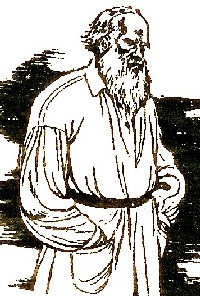
Sketch of Lev N. Tolstoy by Fritz Eichenberg in The Catholic Worker, Jan-Feb 2006:3.
Photos below by Koozma J. Tarasoff. All rights reserved.
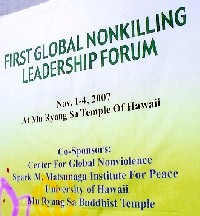
C1484_17A. November 4, 2007. Sign advertising the Global Forum at the Mu Ryang Sa Buddhist Temple, Hawaii.
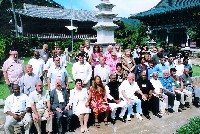
C1485_17. November 4, 2007. Group view of Forum participants, Mu Ryang Sa Buddhist Temple, Hawaii.

C1481_4. November 1, 2007. Forum Co-Chairs: Dr. Balwant (Bill) Bhaneja, Canadian Department of Peace Initative, Ottawa, Ontario and Mairead Corrigan Maguire, Nobel Peace Laureate, Northern Ireland.
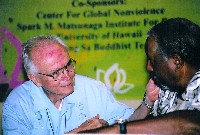
C1482_8A. November 1. 2007. Dr. Glenn D. Paige, Head of the Center for Global Nonviolence and author of Nonkilling Global Political Science, Honolulu, Hawaii, and Dr. Bernard LaFayette, Jr., Director, Center for Nonviolence and Peace Studies, University of Rhode Island, USA.
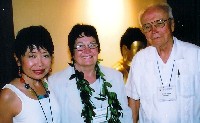
C1483_17. November 2, 2007. Glenda Paige of Hawaii, Mairead Corrigan Maguire of Northern Ireland, and Glenn D. Paige of Hawaii.
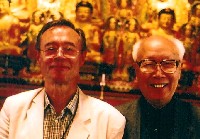
C1486_8. November 3, 2007. Dr. William V. Smirnov, Head of Political Science, Institute of State and Law, Russian Academy of Sciences, Moscow, Russia, and Professor Baoxu Zhao, Honorary Director, Research Center for Contemporary China, Peking University, Beijing, China.
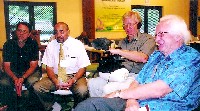
C1483_14A. November 3, 2007. Left to right: (1) Mennonite pastor from Pennsylvania, USA; (2) Dr. Abbel Salam Majali, President of Islamic World, Academy of Sciences, Amman, Jordan; (3) Rich Panter, filmmaker, Panter Productions, Napa, California; (4) Professor Johan Galtung, Founder of TRANSCEND, Norway, Paris and USA.

C1487_3. November 4, 2007. Four Asians: (1) Dr. Hidenori H. Fukui, businessman in St. Paul, Minnesota; (2) Dr. A. T. Ariyaratne, Founder President of Sarvodaya Sharmadana Movement ‘Samudan’, Sri Lanka; (3) Prof. Yoon-Jae Chung, Director of The Sejong Institute, The Academy of Korean Sciences, Korea; (4) Dr. Chaiwat Satha-Anand, Peace Information Center, Faculty of Political Science, Bankok, Thailand; (5) Dr. Mitsuo Okamoto, Professor Emeritus of Hiroshima Shudo University and Director, Hiroshima Center for Nonviolence, Japan.
Nonkilling Society TV

"Nonkilling Society" was a special TV presentation of Poka Laenui's "A Second Glance" series on Oahu Cable TV. It was recorded in October, 2007 featuring Dr. Glenn D. Paige, President of the Center for Global Nonviolence, just before the First Global Nonkilling Leadership Forum on November 1-4, 2007 discussing killing and nonkilling.
Nonkilling Society: Part 1 of 2, 33 minutes. 99.5+% never killed a person, very few see a dead body outside a funeral. Should remove the disease of killing.
Nonkilling Society: Part 2 of 2, 24 minutes. (off-line) Needs vs. wants for power, control, and killing. Science of nonkillng. Justified killings. Will to stop war. Right not to kill or be killed. Human violence is a preventable disease.
Download his free book.
World report on violence and health.
More forum videos.

Testimonials from readers of the
Collected by Koozma J. Tarasoff December 4, 2007 |
Spirit-Wrestlers EXCERPTS
Spirit-Wrestlers NEWS
Spirit-Wrestlers.com